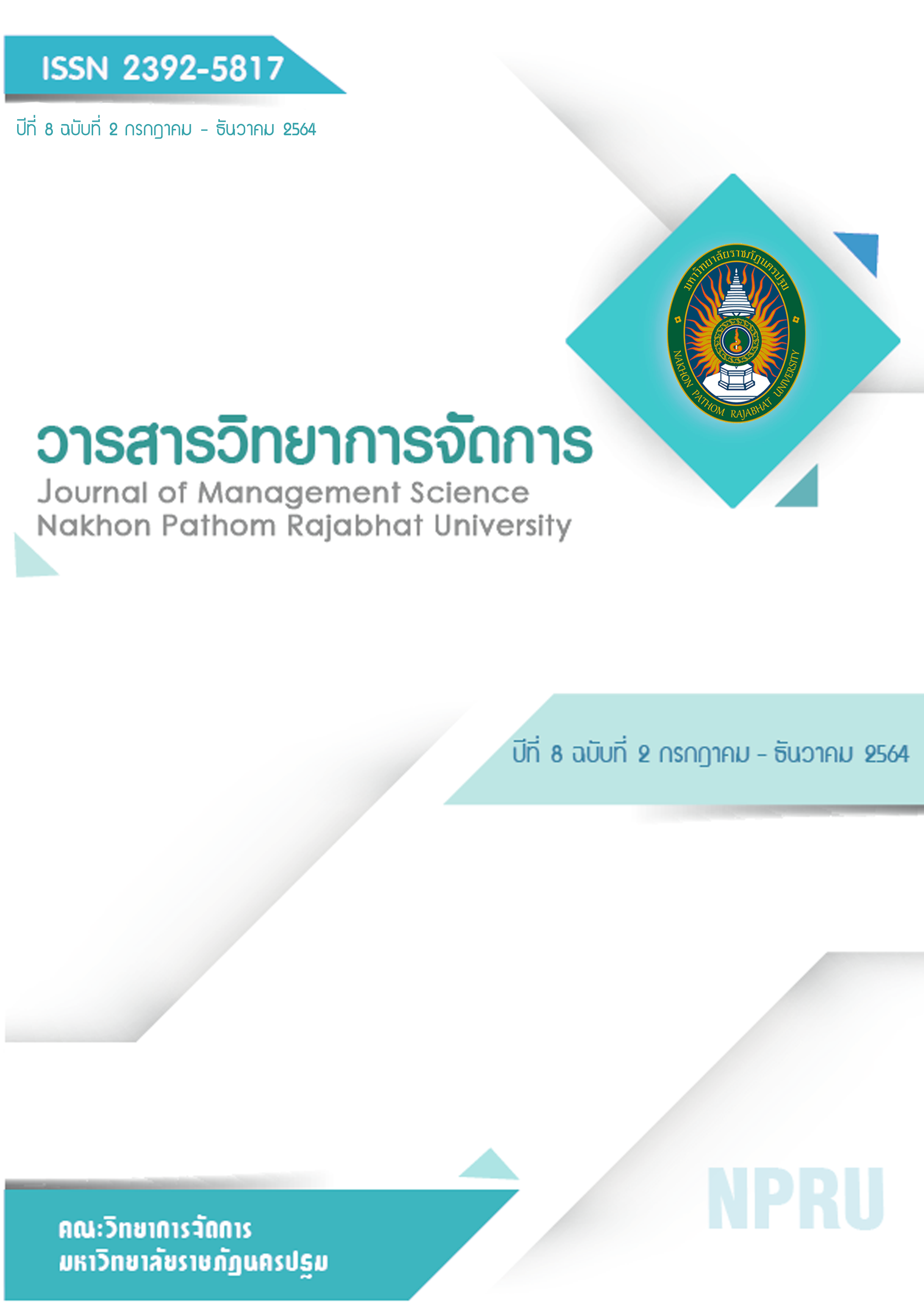ผลกระทบของความพึงพอใจและบุพปัจจัยต่อการสนับสนุนอย่างเป็นทางการของผู้ใช้รถยนต์โตโยตาและฮอนด้าในประเทศไทย เขตกรุงเทพมหานคร
Main Article Content
บทคัดย่อ
การวิจัยครั้งนี้มีวัตถุประสงค์เพื่อศึกษาผลกระทบทางตรงและทางอ้อมของปัจจัยการคาดหวัง การรับรู้คุณภาพ การรับรู้คุณค่า ความพึงพอใจ การจัดการข้อร้องเรียน ความภักดีที่มีต่อการสนับสนุนอย่างเป็นทางการของลูกค้า กลุ่มตัวอย่างที่ใช้ในการวิจัยได้แก่ ผู้มีประสบการณ์การใช้รถยนต์โตโยตาและฮอนด้า จำนวนทั้งสิ้น 600 คน โดยแบ่งเป็นผู้ใช้รถยนต์โตโยตา 300 คนและฮอนด้า 300 คน สถิติที่ใช้ในการวิเคราะห์ได้แก่ ค่าร้อยละ ค่าเฉลี่ย ค่าเบี่ยงเบนมาตรฐาน การวิเคราะห์องค์ประกอบเชิงยืนยัน และตัวแบบสมการโครงสร้าง
ผลการวิจัย พบว่า การคาดหวังมีผลกระทบทางบวกต่อการรับรู้คุณภาพ และความพึงพอใจ แต่ไม่มีผลกระทบทางบวกต่อการรับรู้คุณค่า การรับรู้คุณภาพมีผลกระทบทางบวกต่อการรับรู้คุณค่า และความพึงพอใจ การรับรู้คุณค่ามีผลกระทบทางบวกต่อความพึงพอใจ ความพึงพอใจมีผลกระทบทางบวกต่อการจัดการข้อร้องเรียน และความภักดี แต่ไม่มีผลกระทบทางบวกต่อการสนับสนุนอย่างเป็นทางการของลูกค้า การจัดการข้อร้องเรียนมีผลกระทบทางบวกต่อความภักดี และการสนับสนุนอย่างเป็นทางการของลูกค้า และความภักดีมีผลกระทบทางบวกต่อการสนับสนุนอย่างเป็นทางการของลูกค้า ผลจากการศึกษาผู้บริหารทั้งโตโยตาและฮอนด้า สามารถนำไปประยุกต์ในการสร้างการรับรู้คุณภาพที่สอดคล้องกับความคาดหวัง ให้เกิดการรับรู้คุณค่า เพื่อทำให้ลูกค้าเกิดความพึงพอใจในการจัดการปัญหาข้อร้องเรียนอย่างมีประสิทธิภาพ ทำให้ลูกค้าเกิดความภักดี แล้วให้การสนับสนุนอย่างเป็นทางการ
* นักศึกษาหลักสูตรบริหารธุรกิจดุษฎีบัณฑิต มหาวิทยาลัยรามคำแหง 10240 ดุษฎีนิพนธ์ ภายใต้การดูแลของ ผู้ช่วยศาสตราจารย์ ดร. ประยงค์ มีใจซื่อ และ อาจารย์ดร. นรพล จินันท์เดช
Corresponding author: atchara.urt@gmail.com
Article Details

อนุญาตภายใต้เงื่อนไข Creative Commons Attribution-NonCommercial-NoDerivatives 4.0 International License.
ทัศนะและข้อคิดเห็นของบทความที่ปรากฏในวารสารฉบับนี้เป็นของผู้เขียนแต่ละท่าน ไม่ถือว่าเป็นทัศนะและความรับผิดชอบของกองบรรณาธิการ
เอกสารอ้างอิง
จรรยา ยกยุทธ์ และนลินี ทองประเสริฐ. (2016). ปัจจัยที่มีอิทธิพลต่อกระบวนการตัดสินใจซื้อรถยนต์นั่งส่วนบุคคลขนาดเล็กของผู้บริโภคในเขตจังหวัดอุบลราชธานี. วารสารวิชาการมหาวิทยาลัยราชภัฏอุตรดิตถ์, 11(1), 38-48.
นรีนุช ยุวดีนิเวศ เยาวภา ปฐมศิริกุลและ อมรรัตน์ ศรีวาณัติ. (2562). โมเดลกลยุทธ์การตลาดที่ส่งผลต่อการตัดสินใจซื้อรถยนต์อีโคคาร์ในประเทศไทย. Journal of Economics and Management Strategy, 6 (1), 77-90.
ศูนย์วิจัยธนาคารออมสิน. (2562). อุตสาหกรรมยานยนต์. [ออนไลน์] ค้นเมื่อ 29 ตุลาคม 2562, จากhttps://www.gsbresearch.or.th/gsb/economics/industrial-economics/industry-update/6331/
วรรณา ยงพิศาลภพ. (2562). รายงานแนวโน้มธุรกิจ/อุตสาหกรรม ปี 2563-65: อุตสาหกรรมชิ้นส่วนยานยนต์. กรุงเทพมหานคร: สำนักพิมพ์วิจัยกรุงศรี.
วรรณา ยงพิศาลภพ.(2563). แนวโน้มธุรกิจ/อุตสาหกรรม ปี 2563-2565: อุตสาหกรรมรถยนต์.กรุงเทพมหานคร: สำนักพิมพ์วิจัยกรุงศรี.
Aaker, D. A. (1991). Managing Brand Equity: Capitalizing on the Value of a Brand Name. Free Press, New York.
Amineh, H., and Kosach, N. (2016). Assessment of consumers’ satisfaction with the auto motive product quality. International Journal of Environmental and Science Education, 11(16), 8726-8739.
Automotive Industrial Portal Marklines. (2019). Thailand - Flash report, Salesvolume, 2019. Retrieved January 24, 2020, from https://www.marklines.com/en/statistics/
flash_sales/salesfig_thailand_2019
Carvajal, S. A., Ruzzi, A. L., Nogales, A. F., Valentín, and Moreno, M. (2011). The impact of personalization and complaint handling on customer loyalty. African Journal of Business Management, 5 (34), 13187-13196.
Casey Reader. (2010).The customer loyalty theory market research. Retrieved September 26, 2017, from https://bizfluent.com/info-7746359-characteristics-tqm.html
Comrey, A. L., and Lee, H. B. (1992). A first course in factor analysis. (2nd ed.). Mahwah, NJ: Lawrence Erlbaum Associates.
Dua, K., and Savita. (2013). A study of customer satisfaction with reference to TATA motor passenger vehicles. International Journal of Advanced Research in Management and Social Sciences, 2 (4), 68-83.
Gleim, L., and Robinson. (2015). When perception isn’t reality: An examination of consumer perceptions of innovation. Marketing Management Journal, 25(1), 16-26.
Kaplan, M. D. (2009). The relationship between perceived innovativeness and emotional product responses: A brand oriented approach. Innovative Marketing, 5 (1), 39-47.
Lawer. C., and Knox, S. (2006). Customer advocacy and brand development. Journal of Product and Brand Management, 15 (2), 121-129.
Moosa, M. Y., and Hassan, Z. (2015). Customer perceived values associated with automobile and brand loyalty. International Journal of Accounting and Business Management, 3(1), 92-107.
Mostaghimi, M., Akhlagh, E. M., and Danesh, S. H. S. (2016). An investigation of the effects of customer’s expectations and perceived quality on customer’s loyalty with the mediating role of the perceived value and customer’s satisfaction. Journal of History Culture and Art Research, 5(4), 593-606.
Nikhashemia, S. R., Paim, L., Osmanc, S., and Sidin, S. (2014). The significant role of customer brand identification towards brand loyalty development: An empirical study among Malaysian hypermarkets customer. Procedia-Social and Behavioral Sciences, 207, 182-188.
Othman, M., Kamarohim, N. A., and Nizam, F. M. (2017). Brand credibility, perceived quality and perceived value: A study of customer satisfaction. International Journal of Economics and Management, 11(S3), 763-775.
Pisnik, A., Boris, K., and Zabkar, S. V. (2004). Measurement of perceived quality, perceived value, image, and satisfaction interrelations of hotel services: comparison of tourists from Slovenia and Italy. Journal for General Social, 20(3/113), 602-624.
Somphol Vantamay. (2008). Understanding of perceived product quality: Reviews and recommendations. Journal of Marketing Research, 28(3), 1-8.
Supriaddin, N., Palilati, A., Bua, H., Patwayati, and Jusuf, H. (2015). The effect of complaint handling towards customers satisfaction, trust and loyalty to bank Rakyat Indonesia (Bri) southeast Sulawesi. The International Journal of Engineering and Science (IJES), 4 (6), 1-10.
Susanta, Alhabsji, T., Idrus, M. S., and Nimran, U. (2013). The effect of relationship quality on customer advocacy: The mediating role of loyalty. IOSR Journal of Business and Management, 10(4), 41-52.
Veloso, C. M., Magueta, D. M., Fernandes, P. O., and Ribeiro, H. (2017, September). The effects of customer satisfaction, service quality and perceived value on behavioral intensions in retail industry. Paper presented at the 23th International Scientific Conference on Economic and Social Development, Madrid, Spain.
Walter, A. B., and Horsfall, H. (2017). Perceived satisfaction with organizational response to complaints and repeat purchase intention. IIARD International Journal of Economics and Business Management, 3(6), 11-24.
Wantara, P., and Tambrin, M. (2019). The effect of price and product quality towards customer satisfaction and customer loyalty on Madura Batik. International Tourism and Hospitality Journal, 2(1), 1-9.
WHA Industrial Development. (2019). Electric vehicle. Retrieved December 23, 2020, from https://www.wha-industrialestate.com/en/media-activities/articles/3869/electric-vehicle
Zaw, A. T., and Sirion Chaipoopirutana. (2014). Factors affecting customer loyalty of Toyota cars’ owners in Yangon, Myanmar. Paper presented at International Conference on Business, Law and Corporate Social Responsibility (ICBLCSR’14) Oct 1-2, Phuket, Thailand.


